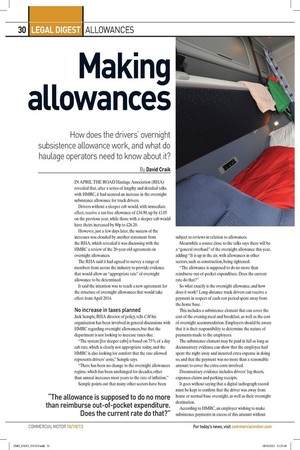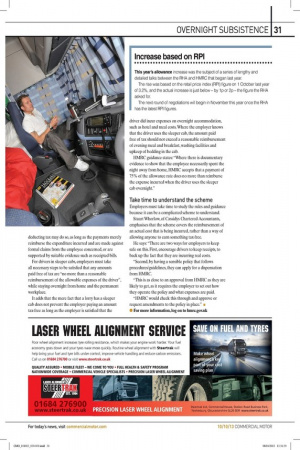Making allowances
Page 24

Page 25

If you've noticed an error in this article please click here to report it so we can fix it.
How does the drivers' overnight subsistence allowance work, and what do haulage operators need to know about it? By David Craik
IN APRIL THE ROAD Haulage Association (RHA) revealed that, after a series of lengthy and detailed talks with HMRC, it had secured an increase in the overnight subsistence allowance for truck drivers.
Drivers without a sleeper cab would, with immediate effect, receive a tax-free allowance of £34.90, up by £1.05 on the previous year, while those with a sleeper cab would have theirs increased by 80p to £26.20.
However, just a few days later, the success of the increases was clouded by another statement from the RHA, which revealed it was discussing with the HMRC a review of the 20-year-old agreement on overnight allowances.
The RHA said it had agreed to survey a range of members from across the industry to provide evidence that would allow an "appropriate rate" of overnight allowance to be determined.
It said the intention was to reach a new agreement for the structure of overnight allowances that would take effect from April 2014.
No increase in taxes planned
Jack Semple, RHA director of policy, tells CM his organisation has been involved in general discussions with HMRC regarding overnight allowances, but that the department is not looking to increase taxes due.
"The system [for sleeper cabs] is based on 75% of a day cab rate, which is clearly not appropriate today, and the HMRC is also looking for comfort that the rate allowed represents drivers' costs," Semple says.
"There has been no change to the overnight allowances regime, which has been unchanged for decades, other than annual increases most years to the rate of inflation." Semple points out that many other sectors have been
subject to reviews in relation to allowances.
Meanwhile a source close to the talks says there will be a "general overhaul" of the overnight allowance this year, adding: "It is up in the air, with allowances in other sectors, such as construction, being tightened.
"The allowance is supposed to do no more than reimburse out-of-pocket expenditure. Does the current rate do that?"
So what exactly is the overnight allowance, and how does it work? Long-distance truck drivers can receive a payment in respect of each rest period spent away from the home base.
This includes a subsistence element that can cover the cost of the evening meal and breakfast, as well as the cost of overnight accommodation. Employers should be aware that it is their responsibility to determine the nature of payments made to the employees.
The subsistence element may be paid in full as long as documentary evidence can show that the employee had spent the night away and incurred extra expense in doing so, and that the payment was no more than a reasonable amount to cover the extra costs involved.
Documentary evidence includes drivers' log sheets, expenses claims and parking receipts.
It goes without saying that a digital tachograph record must be kept to confirm that the driver was away from home or normal base overnight, as well as their overnight destination. According to HMRC, an employer wishing to make subsistence payments in excess of this amount without
deducting tax may do so, as long as the payments merely reimburse the expenditure incurred and are made against formal claims from the employee concerned, or are supported by suitable evidence such as receipted bills.
For drivers in sleeper cabs, employers must take all necessary steps to be satisfied that any amounts paid free of tax are "no more than a reasonable reimbursement of the allowable expenses of the driver", while staying overnight from home and the permanent workplace. It adds that the mere fact that a lorry has a sleeper cab does not prevent the employer paying an amount tax-free as long as the employer is satisfied that the
driver did incur expenses on overnight accommodation, such as hotel and meal costs. Where the employer knows that the driver uses the sleeper cab, the amount paid free of tax should not exceed a reasonable reimbursement of evening meal and breakfast, washing facilities and upkeep of bedding in the cab.
HMRC guidance states: "Where there is documentary evidence to show that the employee necessarily spent the night away from home, HMRC accepts that a payment of 75% of the allowance rate does no more than reimburse the expense incurred when the driver uses the sleeper cab overnight."
Take time to understand the scheme
Employers must take time to study the rules and guidance because it can be a complicated scheme to understand.
Stuart Whorlow, of Cassidys Chartered Accountants, emphasises that the scheme covers the reimbursement of an actual cost that is being incurred, rather than a way of allowing anyone to earn something tax-free.
He says: "There are two ways for employers to keep safe on this. First, encourage drivers to keep receipts, to back up the fact that they are incurring real costs.
"Second, by having a sensible policy that follows procedures/guidelines, they can apply for a dispensation from HMRC.
"This is as close to an approval from HMRC as they are likely to get, as it requires the employer to set out how they operate the policy and what expenses are paid. "HMRC would check this through and approve or request amendments to the policy in place." • • For more information, log on to hmrc.gov.uk









































